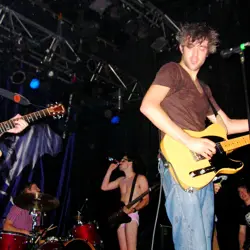 We Are Scientists
We Are ScientistsInto their second decade as an act, New York indie rockers We Are Scientists have remained a veritable mainstay on the world festival circuit since breakout second album, 2004's With Love And Squalor. Their modern take on '70s glam rock and American luminaries such as Fleetwood Mac has struck a chord overseas more so than in their home country. “We pretty much got started [in England] and for whatever reason have not been able to change that geographical rhythm,” Chris Cain explains. “Things kicked off in the UK pretty early on because of a couple of DJs playing our stuff even before we brought out our first record [2002's Safety, Fun And Learning (In That Order)] and for that reason we could tour there before we could do something viable anywhere else. And since then we prioritise the UK; they get the month of shows immediately after the release of a new record. For better or worse, we tend to look abroad first; overseas is the first consideration to plotting a tour on the heels of an album. Which is helpful, because the best way to wind down for us is in a pub with a pint, talking about nothing and doing pop quizzes, and there are plenty of those over in England.”
There won't be much down time over the next few months as the band ramp up their support for their new album, TV en Français. “The first time we saw that title, we were shooting some promotional photos in Miami. The album artwork is in no way doctored. It's on the side of a motel there, and it turns out that offering TV in French is an attractive incentive because a lot of French-Canadians vacation there. When you are driving down the 101 or some other big American freeway, you see offers of free cable or HBO, so the phrase 'TV en Français' that was essentially seen as a bunch of cool photos for us became this weird yet poignant metaphor for what the lyrics of the album were essentially about. We had focused on the disconnect between two people in a relationship; it didn't have to be a romantic connection, although it sprung from the latter stages of a relationship that Keith [Murray] was in. Just that displacement that can occur between two people who for whatever reason need to connect but cannot, so you attempt to make eager allowances even though it's doomed from the get-go. People want that connection to be there, for things to work even when they are moving in the opposite direction. So it's like sitting down to watch TV in a different language – you get the gist of what is going on, and there is the opportunity for one person to get what they want because they understand the language, but the other is becoming further and further lost, the nuance and emphasis is lost. So discovering that phrase seemed like an omen.”
Celluloid is something that We Are Scientists gravitate towards (they acted in their own 2009 MTV series Steve Wants His Money) and the film clip for Dumb Luck shows their proclivity for horror films. “We use every film clip we do to live out some sort of perverse fantasy we have,” Cain laughs. “Oh, I want to be a werewolf today, or I want to smash a bottle over your head, or I want to run through a pane-glass video. Dumb Luck was born of a long-held appreciation of shitty horror movies. I'll preamble this with the admission that we have never done much in the way of ensuring the film clips have any association with the lyrics – we just film stuff that we want to do and get away with. There is at least a glancing correlation with the violence on screen and the lyrics, because it's an accidental violence through happenstance and bad luck, and the type of shit that is dealt out within relationships. But really we just want to film ourselves being maimed.”
There is a subconscious off-the-cuff element to these videos that emblematises We Are Scientists – from their noise meltdowns on stage to the laconic nature of how Cain and Murray interact with the audience and each other. It makes sense that writing together, even after a decade, still comes naturally. “Subconscious correlations are important to us; I don't want to call it laziness or lack of rigour, but we just like to have fun. That's how jokes are born, with that abstract, relaxed way of thinking about the world. If you are a person who thinks in terms of checking off items on your to do list, then it may not be as rewarding to relax and let your mind come to interesting conclusions about problems. But for us, that is the only way we can get through the day.”


















